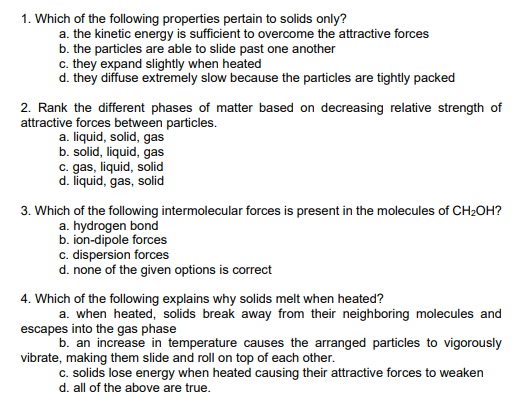1. Which of the following properties pertain to solids only? a. the kinetic energy is sufficient to overcome the attractive forces b. the particles are able to slide past one another c. they expand slightly when heated d. they diffuse extremely slow because the particles are tightly packed
1. Which of the following properties pertain to solids only? a. the kinetic energy is sufficient to overcome the attractive forces b. the particles are able to slide past one another c. they expand slightly when heated d. they diffuse extremely slow because the particles are tightly packed
Introductory Chemistry: An Active Learning Approach
6th Edition
ISBN:9781305079250
Author:Mark S. Cracolice, Ed Peters
Publisher:Mark S. Cracolice, Ed Peters
Chapter15: Gases,liquids, And Solids
Section: Chapter Questions
Problem 15.1TC
Related questions
Question

Transcribed Image Text:1. Which of the following properties pertain to solids only?
a. the kinetic energy is sufficient to overcome the attractive forces
b. the particles are able to slide past one another
c. they expand slightly when heated
d. they diffuse extremely slow because the particles are tightly packed
2. Rank the different phases of matter based on decreasing relative strength of
attractive forces between particles.
a. liquid, solid, gas
b. solid, liquid, gas
c. gas, liquid, solid
d. liquid, gas, solid
3. Which of the following intermolecular forces is present in the molecules of CH2OH?
a. hydrogen bond
b. ion-dipole forces
c. dispersion forces
d. none of the given options is correct
4. Which of the following explains why solids melt when heated?
a. when heated, solids break away from their neighboring molecules and
escapes into the gas phase
b. an increase in temperature causes the arranged particles to vigorously
vibrate, making them slide and roll on top of each other.
c. solids lose energy when heated causing their attractive forces to weaken
d. all of the above are true.
Expert Solution
This question has been solved!
Explore an expertly crafted, step-by-step solution for a thorough understanding of key concepts.
This is a popular solution!
Trending now
This is a popular solution!
Step by step
Solved in 7 steps

Knowledge Booster
Learn more about
Need a deep-dive on the concept behind this application? Look no further. Learn more about this topic, chemistry and related others by exploring similar questions and additional content below.Recommended textbooks for you

Introductory Chemistry: An Active Learning Approa…
Chemistry
ISBN:
9781305079250
Author:
Mark S. Cracolice, Ed Peters
Publisher:
Cengage Learning

Chemistry: Principles and Reactions
Chemistry
ISBN:
9781305079373
Author:
William L. Masterton, Cecile N. Hurley
Publisher:
Cengage Learning

Chemistry & Chemical Reactivity
Chemistry
ISBN:
9781337399074
Author:
John C. Kotz, Paul M. Treichel, John Townsend, David Treichel
Publisher:
Cengage Learning

Introductory Chemistry: An Active Learning Approa…
Chemistry
ISBN:
9781305079250
Author:
Mark S. Cracolice, Ed Peters
Publisher:
Cengage Learning

Chemistry: Principles and Reactions
Chemistry
ISBN:
9781305079373
Author:
William L. Masterton, Cecile N. Hurley
Publisher:
Cengage Learning

Chemistry & Chemical Reactivity
Chemistry
ISBN:
9781337399074
Author:
John C. Kotz, Paul M. Treichel, John Townsend, David Treichel
Publisher:
Cengage Learning

Chemistry & Chemical Reactivity
Chemistry
ISBN:
9781133949640
Author:
John C. Kotz, Paul M. Treichel, John Townsend, David Treichel
Publisher:
Cengage Learning


Chemistry: Matter and Change
Chemistry
ISBN:
9780078746376
Author:
Dinah Zike, Laurel Dingrando, Nicholas Hainen, Cheryl Wistrom
Publisher:
Glencoe/McGraw-Hill School Pub Co